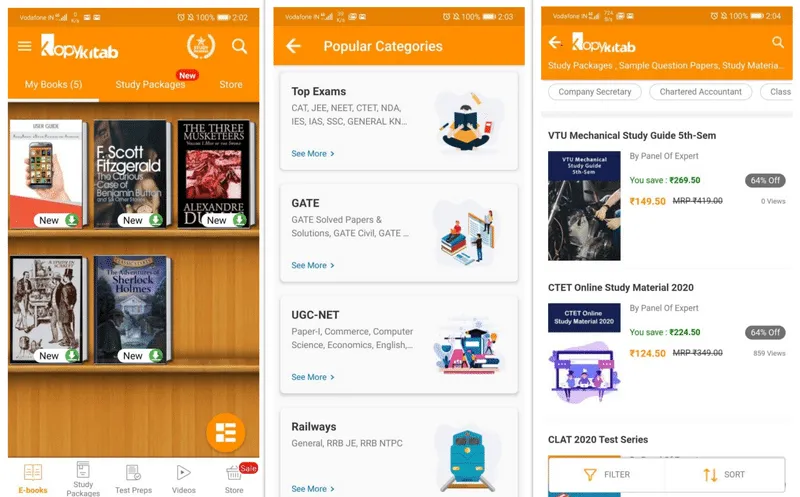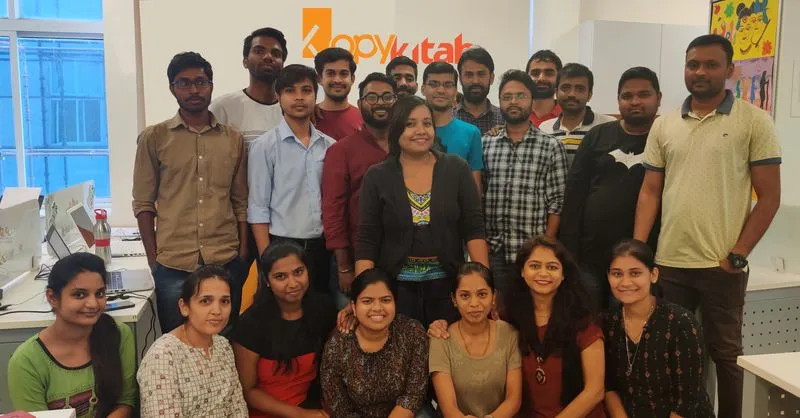This Dell Foundation-backed edtech startup lets students rent textbooks for as low as Rs 10
Bengaluru startup KopyKitab began in 2011 by delivering textbooks to students’ doorsteps. In 2016, it pivoted to an online rental service for e-textbooks. Since then, there's been no looking back.
was among India’s first digital libraries founded in 2011 by Sumeet Verma and Amit Shrivastava.
At the time, India's education sector was yet to go through technological disruption, and ‘edtech’ hadn’t caught up as a term. Textbooks, especially for higher education, cost a lot, and students in small towns had limited access to them.
“In our time, we would have to split chapters between friends to photocopy for notes,” Co-founder and CEO Sumeet recalls.
“That was our learning during school and college, and we wanted to change that,” he tells YourStory.

Sumeet Verma, Co-founder and CEO, KopyKitab
Both co-founders, who went to school in Rewa (a small town in Madhya Pradesh) in the 90s, set out to make education more affordable and accessible.
They started KopyKitab as a textbook rental platform modelled on US-based startup Chegg.com. Students could rent textbooks at a nominal cost, and KopyKitab would deliver and pick-up from their doorstep. The startup set up a procurement office in Delhi and tied up with courier services for deliveries.
It was going well, with the site recording about 100 rentals per day. KopyKitab adopted a B2B model where it tied up with schools, colleges, and other educational institutions to acquire students quickly. But logistics and payment collections remained a challenge.
Also, the business model was cost-intensive, and fully dependent on seasonal demand for textbooks. “When we wanted to scale up, we thought that it was better to do something in digital because edtech was catching up. If we had to build a sustainable business, we had to include technology," Sumeet shares.
“Breakthrough” pivot to B2C
In 2016, KopyKitab pivoted to a B2C model. It partnered with educational publishers to convert physical textbooks into ebooks and digital chapters, which can be bought or rented on its platform.
KopyKitab allows students to rent books at just 20 percent of the MRP or rent even single chapters for as low as Rs 10. Rental periods can vary from a week to a quarter or an entire semester (six months).
Its inventory consists of 200,000 learning resources from more than 150 educational publishers, including S Chand, Oswaal, Laxmi Publications, NCERT Books, Shuchita Prakashan, and others.
There are textbooks, mock tests, and study packages for professional courses like medicine, management, engineering, chartered accountancy, company secretaryship, etc. and even entrance exams like CAT, NET, GATE, IIT-JEE, UPSC, and others.

KopyKitab app
The change in business model turned out to be a “breakthrough”, according to the co-founder.
Sumeet elaborates,
“Our breakthrough came in 2016 when we started focussing on content acquisition and distribution. We also adopted a mobile-first strategy based on the demographics of our customers, who are mostly millennials. We wanted to improve their engagement with our content by understanding the relevance of what we provide.”
The content covers seven languages, and the platform makes margins of about 40 percent to 50 percent per rental, while the rest is shared with publishers or content providers.
The startup rolled out the KopyKitab app with a simple login and also built an in-app e-reader. Students can see the text digitally and do all the things they would typically do on a physical textbook – underline, highlight, annotate, share in a larger study group, and more. They can also access embedded multimedia content.
Essentially, KopyKitab has managed to recreate an offline studying experience online, and at a much lower cost. And, it seems to have worked.
Scaling up and high-growth phase
Since 2016, the Bengaluru-based startup has witnessed rapid growth. It claims to have 4.5 million registered users on its platform, of which more than 53 percent are active.
It has hit an ARR of more than $4 million, clocking “three-digit growth” year on year. The KopyKitab app has recorded 5.8 million cumulative downloads, with average user sessions lasting 35 minutes.
“We have mastered content acquisition and managed to convince publishers of our business model. When we started, the model didn’t exist and it was a challenge to get publishers to give us the content, which was their IP,” says the co-founder.
Like most of its edtech peers, KopyKitab has begun using Artificial Intelligence (AI) to track its users’ consumption patterns and make more accurate recommendations based on language, city, campus, grade level, renting history, etc.
About 68 percent of its users hail from India's Tier II and III towns, with maximum demand coming from Patna, Jaipur, and Indore; five percent are overseas users, while the remaining comes from metros and Tier-I cities.

KopyKitab team
Sumeet observes,
“The hunger for growth and learning is more in students from small towns. The metros have good schools, colleges, tutorials, and high bandwidth, but affordability and access are limited in the Tier II and III cities. That is where we are able to create more impact.”
KopyKitab wants to expand its inventory to half a million learning resources and its registered user base to 10 million by 2021. It also plans to add more languages to its portfolio given the increasing demand for localised content.
Despite having adopted a primarily B2C model, the edtech startup continues to have institutional tie-ups with more than 450 educational campuses across India. “Campuses are the easiest and cheapest way to acquire customers,” says the CEO.
Funding and industry opportunity
In 2018, KopyKitab was backed by ECF, a Rs 100 crore fund registered under the SEBI. The fund’s marquee investors include Michael and Susan Dell Foundation and Gray Matters Capital, both US-based international investors in the education sector.
The startup has also raised about $2 million from Pactolus Singapore, and a bunch of angel investors including Praveen Gandhi, Paula Mariwala (Stanford Angels), Mohit Dubey (), Satyen Kothari (), and others.
Even though India’s books market, which includes fiction, non-fiction, textbooks, self-help books, reference material, and more, is estimated to cross Rs 739 billion (Nielsen data) in 2020, the sector is mostly unorganised. However, the good part is almost 70 percent of traditional publishers are digitising their content.
And therein lies KopyKitab’s biggest opportunity, even though it has peers like IndiaReads, LibraryWala, BigBooks, JustBooks, and others.

Amit Shrivastava, Co-founder and CTO, KopyKitab
Amit Shrivastava, Co-founder and CTO, KopyKitab told YourStory in an earlier interaction,
“If you look at the education sector, only 20 percent is organised. The rest is unorganised, which comprises borrowing, lending, and photocopying of books. So, we’re allowing publishers to cater to this massive market through digital media.”
Additionally, with the K-12 segment in India heating up with major players like , , , Doubtnut, and many more, KopyKitab is chasing the higher education and competitive exams segment to carve a niche for itself.
Sumeet sums up by saying, “Reports say that millennials spend only 25 percent of their time on studies. They need everything quickly on the go. At KopyKitab, we are giving them that... bite-sized learning on their mobiles.”
(Edited by Saheli Sen Gupta)







1562063387320.png?fm=png&auto=format&h=100&w=100&crop=entropy&fit=crop)
1550491304900.jpg?fm=png&auto=format&h=100&w=100&crop=entropy&fit=crop)






